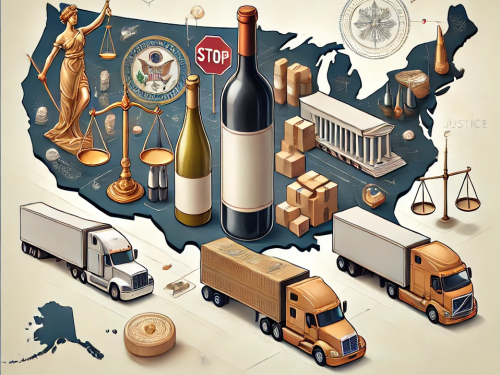Interstate Retailer Wine Shipping: The White Paper
The American wine landscape is a complex tapestry woven from diverse producers, a vast array of wines, and a patchwork of state-level regulations. This intricate system faces a significant challenge in the form of restrictions on interstate retailer wine shipping. These limitations create a fragmented marketplace, hindering consumer access to a wide variety of wines and stifling the growth of the industry. This article delves into the depths of interstate retailer wine shipping, exploring the multifaceted legal, regulatory, and economic forces shaping its present and future.
Unveiling the Current Market:
Currently, a mere 13 states and the District of Columbia extend to their residents the freedom to receive wine shipments from out-of-state retailers. This limited access has created a stark imbalance in the marketplace, effectively barring consumers in many states from a vast selection of wines, including both imported and small-production gems. This imbalance not only limits consumer choice but also perpetuates a system where access to diverse wines is often dictated by geographical boundaries.
Navigating the Legal and Regulatory Labyrinth:
The 21st Amendment to the U.S. Constitution, while ending Prohibition, introduced a new layer of complexity to the American alcohol industry. It bestowed upon individual states the authority to regulate alcohol sales and distribution within their borders. This has resulted in a fragmented system characterized by a complex web of state-specific laws and regulations, creating significant hurdles for interstate wine shipping. However, a beacon of clarity has emerged from the Supreme Court, which has ruled against state-level discrimination against out-of-state retailers. States cannot favor their own retailers by allowing them to ship wine while simultaneously prohibiting out-of-state retailers from doing so.
Reaping the Rewards of Interstate Retailer Wine Shipping:
Embracing interstate retailer wine shipping would unlock a trove of benefits for consumers, producers, and states alike:
- Unleashing Consumer Choice: The virtual doors to a vast selection of wines would swing open for consumers, granting them access to bottles not available in their local markets. This newfound freedom would empower consumers to explore a broader spectrum of the wine world, fostering a deeper appreciation for its diversity.
- Unlocking Value for Consumers: Increased competition, akin to a rising tide, could lift all boats, leading to lower prices for consumers across the board. This would make a wider range of wines more accessible, enhancing the overall consumer experience and potentially expanding the market to new demographics.
- Enriching State Coffers: State governments would stand to gain from the increased economic activity generated by interstate wine sales. The additional tax revenue could be channeled towards public services, benefiting the community as a whole. This potential economic boon makes a strong case for states to consider legalizing interstate retailer wine shipping.
- Nurturing Small Producers: Small and boutique wineries, often overshadowed by larger players, would find a lifeline in interstate wine shipping. It would allow them to reach a wider audience, showcasing their unique offerings to consumers in states where their wines may not be readily available. This increased exposure could be instrumental in their growth and success.
Charting a Course for Responsible Legislation:
States contemplating legislation to legalize interstate retailer wine shipping should navigate these waters responsibly, guided by best practices:
- Open Permit Systems: A welcoming approach, allowing all out-of-state retailers to obtain a permit to ship wine into the state, would foster a more inclusive marketplace. This would ensure that consumers have access to the widest possible selection of wines from diverse retailers across the country.
- Reasonable Permit Fees: Ensuring permit fees are within reasonable bounds would prevent them from becoming prohibitive barriers to entry. This is crucial to encourage participation from smaller retailers and maintain a diverse marketplace accessible to a wide range of businesses.
- Clear Jurisdictional Consent: Establishing clear jurisdictional consent would ensure that out-of-state retailers are subject to the state's legal and regulatory framework. This would provide a level playing field and ensure that all retailers operate under the same set of rules, protecting both consumers and the integrity of the marketplace.
- Protecting Consumer Privacy: In an era of increasing data sensitivity, states must prioritize the protection of consumer privacy. Ensuring that reporting requirements do not unnecessarily reveal private information about consumers is essential to maintain trust and confidence in the system.
Conclusion: A Toast to the Future
Interstate retailer wine shipping represents a pivotal opportunity to modernize the American wine industry, bringing benefits to consumers, producers, and states alike. By embracing responsible legislation, states can uncork a future marked by a more open, competitive, and consumer-centric marketplace. This would not only enhance the enjoyment of wine for consumers across the nation but also stimulate growth and innovation within the industry. As we raise a glass to the future, let us envision a wine landscape where access to diverse wines is no longer confined by state borders, but rather flows freely, enriching the American wine experience for all.

